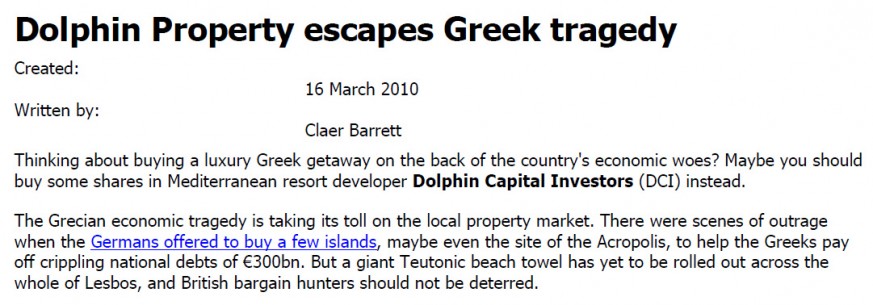Thinking about buying a luxury Greek getaway on the back of the country’s economic woes? Maybe you should buy some shares in Mediterranean resort developer Dolphin Capital Investors (DCI) instead.
The Grecian economic tragedy is taking its toll on the local property market. There were scenes of outrage when the Germans offered to buy a few islands, maybe even the site of the Acropolis, to help the Greeks pay off crippling national debts of €300bn. But a giant Teutonic beach towel has yet to be rolled out across the whole of Lesbos, and British bargain hunters should not be deterred.
DCI, the largest property company on London’s Alternative Investment Market (Aim), is so hacked off with illiquidity on the junior market that it is offering shareholders 50 per cent off the price of one of its luxury holiday villas. All they have to do is pay in shares.
You will need to buy quite a lot of shares, mind you – Dolphin’s properties are pricey. We are not talking about flats shoehorned into a site; their villas boast private pools and large gardens, and are gracefully dotted around beachfront golf courses. Or rather, they will be when they’re built.
The “Shares for Assets” trial last April convinced 39 shareholders to swap their stakes for property, and the company announced with final results last week that it intends to roll out the programme. That’s a lot of choice for wealthy holiday home investors; the group is progressing 13 luxury resort developments in Greece, Cyprus, Turkey and Croatia, and has latterly expanded into the Dominican Republic and Panama.
So why is the company resorting to such measures? The short answer is to close the cavernous 70 per cent discount to net asset value (NAV) that its shares currently trade at. “We are looking for all the ways possible to drive up our share price,” Miltos Kambourides, managing partner of investment manager Dolphin Capital Partners tells me.
Swapping discounted property boosts Dolphin’s balance sheet. The value of the 39 properties exchanged in 2009 amounted to €4.2m, while the underlying NAV of the shares exchanged for them was €23.4 million. Even allowing for the 50 per cent discount, the properties were still sold above NAV. The whole exercise is an indirect share buy-back, using assets instead of cash.
Further creativity was in evidence at October’s half year results, when Hallmark Investors (the joint entity of DCP, DCI’s biggest shareholder Theodoros Aristodemou and US hedge fund Fortress) made a tender offer ranging from 34-44p-a-share, believing the price was just too cheap.
I rated the shares as a , spotting a short-term trading opportunity. Sure enough, the wide discount to NAV meant the tender prices were at the top of this range, and shares rallied. Despite the recent dramas in Athens, they stand at 52p today, netting a 44 per cent uplift for anyone who followed my recommendation. So is now the time to sell up and go home? That rather depends on your view of the holiday property market.
Hallmark collectively controls 51 per cent of DCI’s shares, leading many brokers to believe that Dolphin will follow many of its smaller Aim property peers and . Not so, says Kambourides, adding this would be bitterly opposed by institutional shareholders.
“Given the £2bn asset base of Dolphin, we think we should revisit a main market listing, as that’s where the real liquidity kicks in,” he says. “For that to happen, we need more share price recovery.”
An expanded shares for assets programme could well boost liquidity in the shares, as the wealthy are back buying property. “In February, we sold three times more property than we were budgeted to sell, and March has also been strong,” he says. Wealthy Russians account for more than 50 per cent of sales, but the Brits are slowly coming back.
Kambourides says international buyers mean luxury property prices are immune to the Greek problems. “It’s like asking me if Gucci handbags are going to be cheaper in Athens,” he scoffs. One positive side effect is the fall in construction costs.
A big tick in Dolphin’s favour is the €100m banking facility it thrashed out with an (unnamed) local bank last month. This will fund the first phases of two developments in Greece and Cyprus. Agreed on a 13-year term, the loans will be serviced by the expected returns from the projects as properties are sold.
With the promise of greater liquidity ahead, I stick with my speculative buy stance at 52p, but beware – there are clearly risks associated with the local property market that could trap our leaping dolphin in a net.

